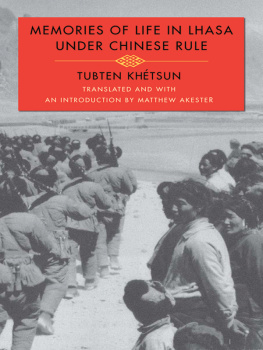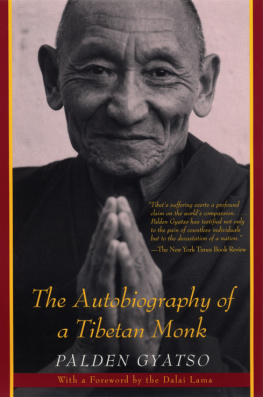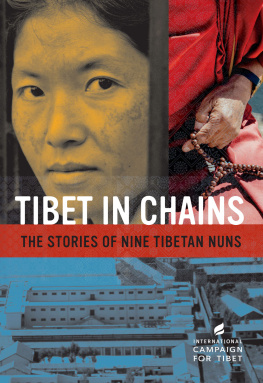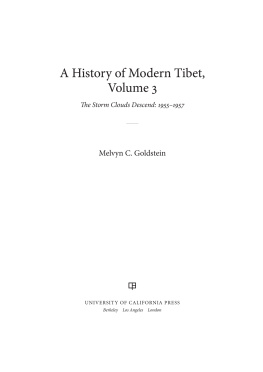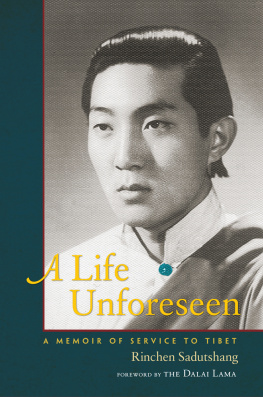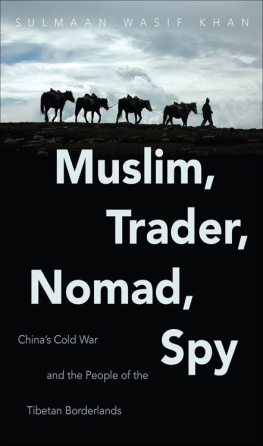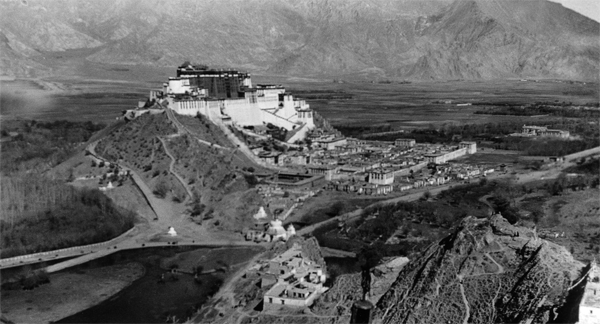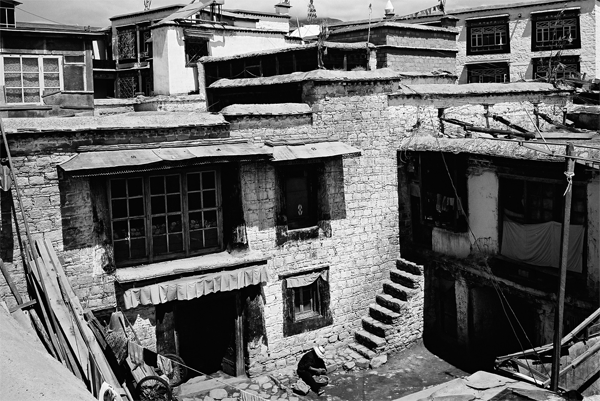OUR HOUSEHOLD IS known as Gyatso Tashi, and was so named after the builder of our family house, in the Banak-shl area of Lhasa. Our forebears were farmers from Nymo district who settled in Lhasa after two successive family members served as officials in the palace bursary (rTse phyag las khung) of the Ganden Po-trang government. One of them, Sonam Rabten-la, married Tsewang Sangmo, daughter of the Lhasa resident Ba-pa Changdz-la, and they had one son and one daughter. Their son, Tubten Changchup, the elder of the two, became a novice monk in the Tsangpa Khen-chens residence in Drpung monasterys Losling college, and later entered government service as a monk-official (rTse drung). Their daughter, Pema Drlkar, was my mother. Following social convention, my father, Changchup Lo-dro of Lhasa Gych-ling, joined the household as her husband (Mag pa). His father came from the Lha-khang-teng family from Rinchen-gang in Tromo, and had joined Lhasa Gych-ling through marriage (Mag pa). He served as a clerk (Jo lags) in the government Labrang Bursary (Bla phyag las khung), and passed away while on the annual grain procurement mission to Tingky. My grandfather Sonam Rabten-la retired at the age of sixty after an exemplary career in the palace bursary and took full monastic vows, dedicating the rest of his life to religion.
My father, Changchup Lo-dro, was duly appointed in his stead to the bursary, where he served as a clerk. He worked diligently in recognition of the governments kindness, and was the Jo-la selected to supervise the mission organized every four years to visit Nepal and make offerings to the three great stupas there, offer religious objects to the Nepalese king, and procure official supplies such as rice (Bal yul rten bzhengs). He fulfilled this task on two successive occasions. Later on, in the earth mouse year 1948, when he was forty-two, he was appointed government trade officer in west Tibet, but tragically, he came down with a fever and did not survive
Panorama of Lhasa in 1942, with the Potala Palace at the upper left, by Demo Rinpoche Tendzin Gyatso. After Wangchuk Dorje 2005.
My eldest brother, Jampa Tsultrim, was serving as a palace steward (rTsemgron) at the time of the 1959 uprising against the unacceptable subjection of the Tibetan people by the Red Chinese invaders. He was arrested at the Summer Palace (Nor bu gling ka) and subjected to twenty years of torture and imprisonment. After his release, he worked in the research department at the TAR teacher training college, and in 1983 he traveled to India to seek an audience with His Holiness the Dalai Lama and took up employment in His Holinesss private office. The next eldest, my sister Losang Chnyi, a nun, was imprisoned for three years by the Chinese and later went to settle in India, together with my two younger nun sisters and younger brother Jampun. My elder sister Yangchen Drlkar, younger sister Tendrl, and younger brother Nga-nam have remained in Lhasa. My elder brother Ysh Khdrup was a monk-scholar at Drpung at the time of the uprising. He escaped to India, where he worked for the exile government teacher recruitment program and the Mussoorie school, before requesting leave to join the Mongolian Gsh Wangyel-la in New Jersey in America, where he now works for the [Voice of America] Tibetan-language broadcasting service.
My mother, Pema Drlkar, dedicated herself to the service of others, had great faith in the Three Jewels [of Buddhist refuge], and always strove to be virtuous. In 1959, when the popular uprising broke out, she joined the Womens Association when it was first established at Shl (below the Potala). She participated in the demonstrations and was one of the associations delegates to the parliament (gZhung dmangs tshogs dus), and one of the delegates sent to plead the truth of Tibets case with the resident Indian trade representative, the Nepalese and Bhutanese representatives, and leaders of the Muslim community. Following the violent suppression of the uprising by the Chinese authorities, they summoned my mother, while she was severely ill, to the Tsmn-ling Reeducation Center that they had set up for the systematic investigation and interrogation of participants in the uprising. Only when her illness worsened was she permitted to return home, and even as she approached death, Chinese officials repeatedly came to search the house and harangue us, saying that her imprisonment could not be delayed further. But before long, later the same year, she passed away. This was our kind mother, a courageous and unselfish patriot who had loved and cared for us so tenderly, and to be separated from her by imprisonment while she was still with us, only to be separated by death straight after, oppressed us with tremendous sorrow, especially as we never had the opportunity to commemorate everything she had done for us. I continually pray and beseech Arya Lokesvara never to forsake her throughout all her future lives, in memory of her great kindness and exemplary conduct.
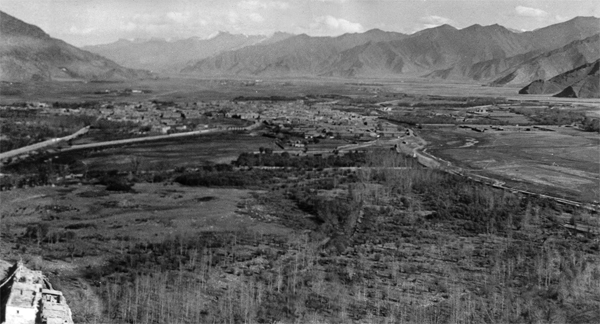
The Gyatso Tashi family house in Lhasa, 1998. Photo by Andre Alexander
My mothers elder brother, my uncle Tubten Changchup-la, studied at the Tarpo-ling primary school before becoming a monk at Drpung, where he voluntarily and earnestly continued his studies. His father, Sonam Rabten-la, performed a divination (Pra phab) to discover whether he would complete his academic studies, and the response came clearly expressed in a four-line stanza. I was not able to discover the first two lines, but the last two said: Despite aspirations for the religious life, external factors will cause obstacles / To perform service beneath the golden throne is excellent!
To give a brief account of his service in the Tibetan Ganden Po-trang government: his father was sent to India several times to procure supplies on behalf of the great Thirteenth Dalai Lama, which he did well, and the Dalai Lama showed His pleasure at this by asking about his son. Later, after he had returned from another supply mission to India, they were suddenly notified that Tubten Changchup, then aged eighteen, had been appointed as a monk-official to the palace secretariat (Yig tshang laskhung). While serving there, he worked on the collection of pastoral taxes at Uyuk Lingkar, served as sacristan of the Eleventh Dalai Lamas (Phanbde od bar) reliquary stupa in the Potala, and assisted in the construction of the Thirteenth Dalai Lamas reliquary stupa (dGe legs dod jo). He was an estate manager in the n valley, was a librarian, and accompanied the former Purbu-chok incarnation on a mission to the northern territories to identify candidates for the recognition of the Fourteenth Dalai Lama. He served as a steward of the fifth rank under the Taktra regent, and when the fourth-rank senior monk-official (mKhan chung) was promoted to governor of Lho-ka province (lHo spyi), he managed the ongoing office work for the next five years. Then he worked for a short time in the foreign ministry, and took charge of the office that organized special government-sponsored pujas (Zhabs phar) for a few years. Then he was appointed state monastic representative (mKhan nang) in Nakchu, as counterpart of the fourth-rank [lay] official Mnkyi-lingpa, and again as governor of the northern provinces (

